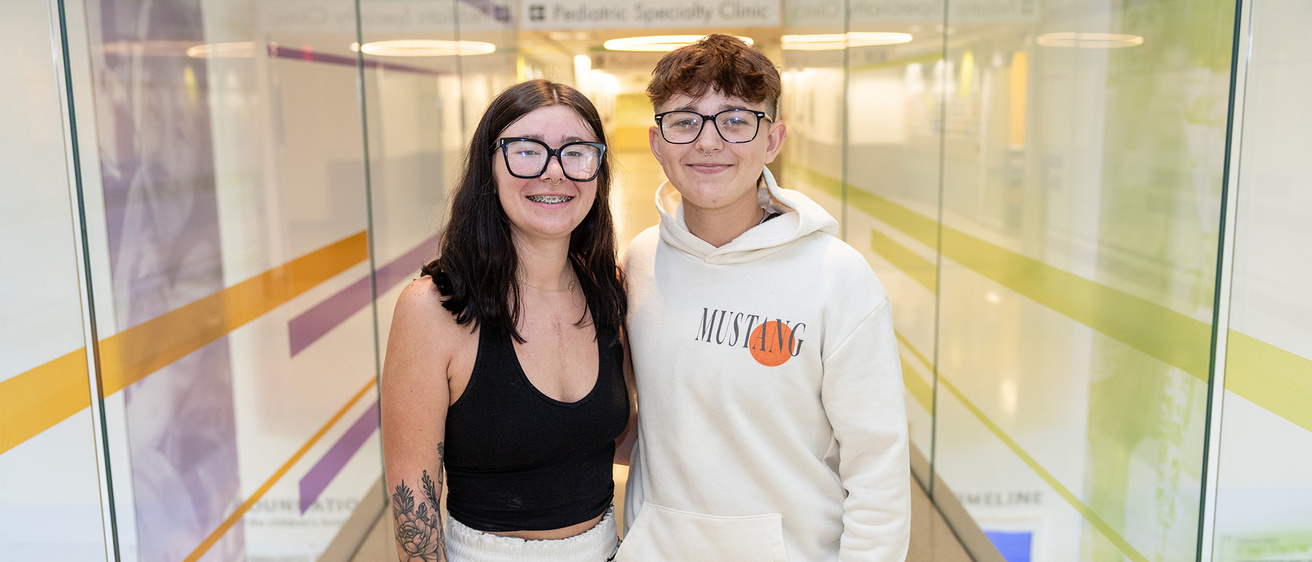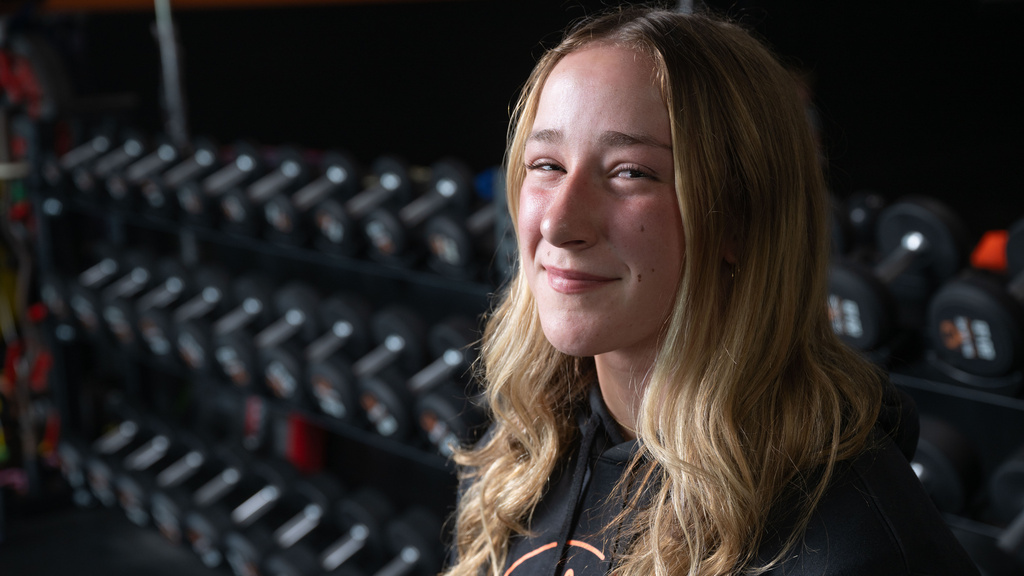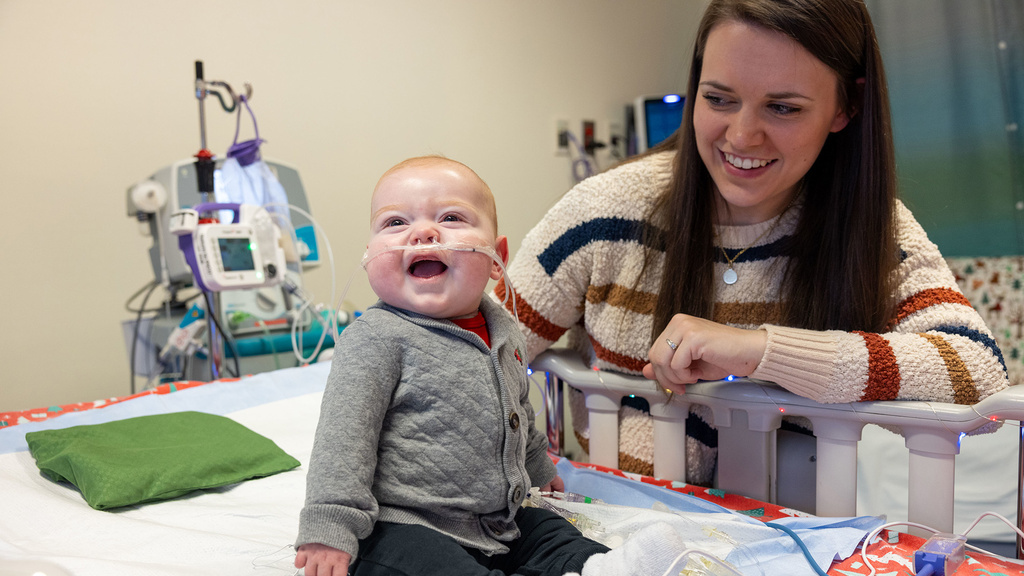Since receiving life-saving transplants, Iowa sisters Brooklyn and Kamryn Soroka have continued to embrace new memories and experiences.
Story: Madison Schuler
Photography: Liz Martin and courtesy of the Soroka family
Published: Sept. 15, 2025
Many children grow up full of anticipation and excitement, bursting with the thrill of attending another family vacation, making plans to hang out with friends, and dreaming about the future.
For the Soroka family from Norwalk, Iowa, those expectations flipped when a life-changing diagnosis marked the beginning of a new journey filled with challenges and milestones.
Then, the single diagnosis quickly turned into two.
“We were told Kamryn carried the same gene as her sister, Brooklyn, but that didn’t mean she would necessarily get sick,” their mother, Dana Soroka, recalls. “But then, suddenly she did.”
Discovering the unknown
It all started in 2014 when 12-year-old Brooklyn passed out during gym class, leading to a deeper evaluation and extensive testing to determine the cause.
The results revealed the source of her symptoms: two heart conditions.
“I was mad, scared, and upset. I didn’t fully understand why I wasn’t like everyone else my age,” says Brooklyn, now 23.
The two heart conditions are known as mixed cardiomyopathies, a combination of hypertrophic cardiomyopathy and restrictive cardiomyopathy.
Hypertrophic cardiomyopathy causes abnormal thickening of the heart muscle, creating problems with blood flow, strokes, and other severe symptoms. Restrictive cardiomyopathy makes the walls of the heart extremely rigid, preventing the heart from properly stretching and filling with blood.
Combined, the two conditions greatly increased Brooklyn’s chance for sudden death.
Faced with the sobering diagnosis, the Soroka family turned to the experts at University of Iowa Health Care Stead Family Children’s Hospital for next-level care.
Although UI Health Care offered a closer option with local clinics in Des Moines, the family made the decision to regularly make the 250-mile round trip to Iowa City to stay closely connected with the team they trusted most.
Care for heart conditions
Heart problems can affect young children, adolescents, or the baby in the womb. If there are concerns about your child’s heart health, your pediatrician may recommend a cardiologist, a specialist in the detection and treatment of heart disease in children. The pediatric cardiologists at Stead Family Children’s Hospital are dedicated to providing compassionate, state-of-the-art and convenient delivery of care to children and young adults.
The pediatric cardiology division offers complete clinical services for the diagnosis and treatment of congenital and acquired heart disease in babies, children and young adults.
“We would go to [UI Health Care’s] outreach clinic in Des Moines, but our appointments started becoming more frequent because we were starting to exhibit more signs and symptoms of heart failure,” Dana says. “Every experience we’ve had with [the cardiology team] has all been very pleasant.”
The frequent clinic visits and testing soon forced Brooklyn to drop out of her dance program and limit other forms of physical activity.
“I could no longer be a ‘normal’ teenager,” she says. “Any chance at playing sports or doing any type of physical activity was gone. From eighth grade to senior year of high school, I did an online PE class.”
Despite the frustration, the Soroka family continued to rely on the pediatric cardiology program at Stead Family Children’s Hospital, giving hope for a life full of making more memories and looking toward the future.
“I felt cared for by my cardiology team. There was always someone available for me to reach out to if any questions or concerns were to arise.”
Treating a life-threatening condition
Brooklyn’s care team included pediatric cardiology and transplant specialists who worked closely with her throughout her journey.
Over the years, her treatment included beta blockers, regular blood work, and yearly cardiac catheterizations to monitor her condition.
“I felt cared for by my cardiology team,” she says. “There was always someone available for me to reach out to if any questions or concerns were to arise.”
After managing her condition for almost seven years, Brooklyn joined the transplant list in 2020, and received her new heart on that Christmas Eve.
“Without my heart transplant, my life would not be as it is today — there’s a chance I wouldn’t have even made it to today,” she says.
Following surgery and recovery, Brooklyn began living her life the way she had always hoped.
She then started her follow-up treatment, which later transitioned to Gary Beasley, MD, pediatric cardiologist and medical director of the Pediatric Transplant/Heart Failure Program at Stead Family Children’s Hospital.
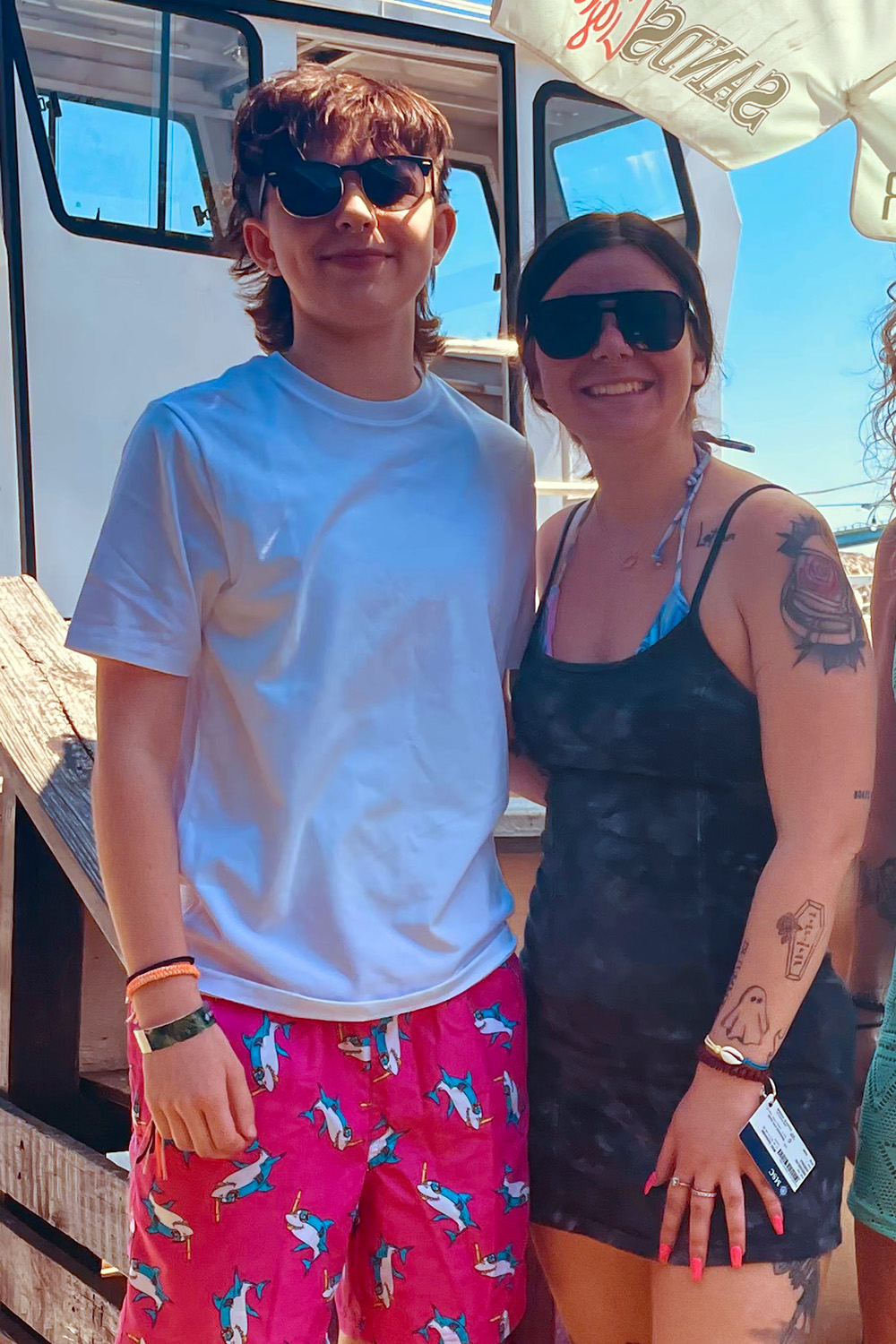
Kamryn (left) and Brooklyn Soroka pose for a photo during a family vacation. The siblings have genetic cardiomyopathy and both received heart transplants at UI Health Care.
An extensive care team including Beasley treated Brooklyn during weekly and monthly visits before she transferred into a maintenance phase of appointments every two to six months.
Those clinic visits included echocardiograms, cardiac catheterizations, and biopsies to monitor heart health and detect rejection. Additionally, blood work was required almost monthly to monitor immunosuppressive medication levels.
“We talk to most of our transplant patients at least monthly, and they come in for routine tests every few months,” Beasley says. “This isn’t care you give once — it’s lifelong.”
Another shocking diagnosis
Soon after Brooklyn was diagnosed and began treatment for her mixed cardiomyopathies, her younger sister Kamryn was tested for the same condition.
While testing showed that Kamryn carried the same gene, there was a possibility that she would never develop symptoms. She was carefully monitored and initially seemed unaffected. But only two years after her diagnosis, Kamryn passed out unexpectedly in fifth grade, leading doctors to implant a loop recorder to observe her heart.
Then, in eighth grade, Kamryn experienced a cardiac arrest. The loop recorder revealed it had been caused by a dangerous arrhythmia. Soon after, she had a defibrillator placed and began exhibiting more signs of heart failure.
“That’s when our lives really changed,” Dana says. “From that point on, we started talking about another transplant.”
As Kamryn joined the heart transplant list, she continued to receive care from the Stead Family Children’s Hospital team, which included more frequent labs, visits, and finally a full transplant evaluation during her freshman year of high school.
She officially joined the heart transplant list in July 2023, and six weeks later, she received her new heart.
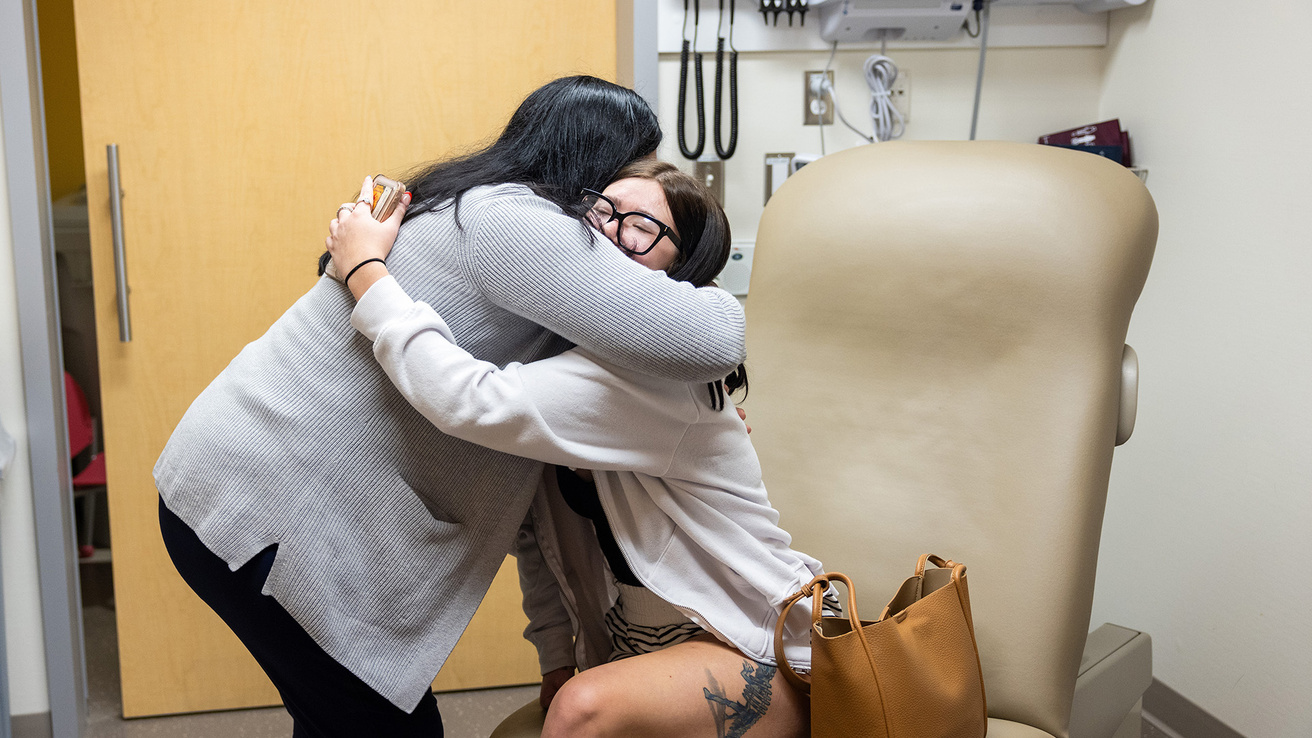
Brooklyn Soroka embraces cardiologist Rabia Khan, MD, in the UI Health Care Pediatric Specialty Clinics during a July 2025 visit. Khan is part of the team caring for Brooklyn and her sister Kamryn Soroka, who have genetic cardiomyopathy and both received heart transplants at UI Health Care.
Life beyond the transplants
The personalized approach Stead Family Children's Hospital takes with every transplant patient — not just for the short term, but for life — has provided comfort for the Soroka family every step of the way.
“Taking care of a heart transplant is complex,” Beasley says. “We want to make sure patients have both quality and quantity of life from that donor heart.”
Stead Family Children’s Hospital has been a pediatric heart transplant center since 1987 and has performed more than 100 pediatric heart transplants.
In addition to transplant care, the team provides advanced cardiac support through ventricular assist devices — artificial pumps that help the heart to circulate blood. This program began in 2008 and has helped more than 50 patients who needed mechanical support for their hearts.
“It’s not just myself, the other transplant cardiologist, and our nurses,” Beasley says. “We work with pain and palliative care specialists, nephrologists, pulmonologists, so that we are providing holistic and comprehensive care for every patient.”
“The care is beyond any level of care that you would accept or expect — it was always beyond that.”
Because the Soroka sisters’ condition is genetic, Stead Family Children’s Hospital also screened other family members and tailored its care plan to the entire household.
“We do a lot of tailoring and personalization — not just for the patient but for the whole family,” Beasley adds.
As Brooklyn continues into adulthood, she is transitioning from pediatric to adult transplant care — a process supported by the same Stead Family Children’s Hospital team that’s been with her for more than a decade.
“My day-to-day life now may not look too different from a ‘normal’ person; I work a full-time job, as well as a part-time job, spend time with the people closest to me, and enjoy the little things life has to offer,” Brooklyn says. “I live each day as best as I can.”
Her younger sister Kamryn, now 17, continues in her footsteps, living life to the fullest as any typical high schooler would.
“The care is beyond any level of care that you would accept or expect — it was always beyond that,” Dana says. “And Kamryn even has a song she sings to Dr. Beasley.”
As both sisters continue to thrive, they attend follow-up appointments a few times each year, supported by the team that has been there every step of the way.
“At this point, we’re excited,” Beasley says. “They’re able to live the rest of their lives as if they didn’t have a heart transplant.”
